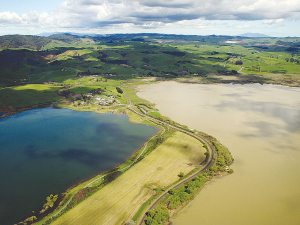University of Waikato breaks ground on new medical school
The University of Waikato has broken ground on its new medical school building.
 University of Waikato freshwater scientist Dr Deniz Ozkundakci says many waterways in Waikato are in urgent need of protection.
University of Waikato freshwater scientist Dr Deniz Ozkundakci says many waterways in Waikato are in urgent need of protection.
Waikato is home to a diverse range of lakes, and experts say they urgently need better management and restoration.
University of Waikato freshwater scientist Dr Deniz Özkundakci says "a lot, if not most" of the hundreds of lakes in the region are significantly degraded and in urgent need of action to protest and restore their health.
"At the same time, we have some truly hidden gems - lakes that rank among the best in the country. The region includes the full spectrum of lake condition, from outstanding lakes to some of the most degraded," he says.
The findings are part of a newly released book, a joint venture by the University of Waikato and the Waikato Regional Council.
Lakes often hold strong emotional value for people, whether it be childhood memories of learning to swim, fishing or water skiing to summer holidays with family, Özkundakci says.
However, farming and urban development has resulted in several lakes being much smaller and shallower than they were in the early 1900s.
Water quality remains one of the biggest concerns.
"Most of the lakes are all enriched in nutrients, particularly phosphorus and nitrogen from farmland runoff, causing algae bloom and turning the water a bright greeen and making it smell bad," he says.
"In some lakes, aquatic plants have disappeared entirely. Where plants remain, they're often overrun by invasive species. We've also lost many lake birds that relied on native plants and the food they provided."
But it's not all doom and gloom, says Özkundakci, who noted that many community groups have started to get involved in restoration efforts.
However, he says that "while promising efforts are underway, scaling them up will be essential to deliver the widespread impact that is urgently needed".
Özkundakci also notes that many of Waikato's hidden lake treasures are tucked away on private land and far from major roads or access points, making them largely unknown and inaccessible to the wider public.
"People often don't even know these lakes exist, and many of the really beautiful ones are located on private property," he says.
"This makes it very difficult to access them and work on protecting these valuable ecosystems."
Özkundakci says there are examples where lake health has improved when the right work has been done.
"Improvements are always possible if enough resources are put in. But often the limiting factor is the lack of resources like people, power and money. At some point though, we need to have honest conversations about priorities.
"Every time we come to a lake, and we talk to the local community, they say that giving up is not an option for us - I know that," he says. "At the same time, several contributors to this book have made it clear just how difficult it will be to restore all of the lakes."
He emphasises the importance of ongoing dialogue and collaboration, while also acknowledging the challenges.
"There is recognition that restoring ecosystems requires both scientific insight and inclusive governance," he says.
Fonterra’s impending exit from the Australian dairy industry is a major event but the story doesn’t change too much for farmers.
Expect greater collaboration between Massey University’s school of Agriculture and Environment and Ireland’s leading agriculture university, the University College of Dublin (UCD), in the future.
A partnership between Torere Macadamias Ltd and the Riddet Institute aims to unlock value from macadamia nuts while growing the next generation of Māori agribusiness researchers.
A new partnership between Dairy Women’s Network (DWN) and NZAgbiz aims to make evidence-based calf rearing practices accessible to all farm teams.
Despite some trying circumstances recently, the cherry season looks set to emerge on top of things.
Changed logos on shirts otherwise it will be business as usual when Fonterra’s consumer and related businesses are expected to change hands next month.
OPINION: Fonterra may be on the verge of selling its consumer business in New Zealand, but the co-operative is not…
OPINION: What does the birth rate in China have to do with stock trading? Just ask a2 Milk Company.